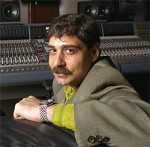Column Name
Title
Subhead
No one could have predicted Harold Hagopian’s career path. As founder of the world music label Traditional Crossroads, which he started in 1993, Hagopian (BM ’88, violin) has spent the last 16 years overseeing an influential company that has released many critically acclaimed albums of world and ethnic music. As a violinist, he premiered a violin concerto written for him by Alan Hovhaness, with the Tulare Symphony in California in 1994. As an entrepreneur, he cofounded a company that manufactures and sells the Heifetz mute, a special, adjustable-pressure violin mute that had been discontinued in the 1960s. And as a music producer, he supervised the restoration of more than 1,000 RCA records. Though it is a surprising journey for a Juilliard violin student, all of Hagopian’s various achievements grew from his remarkable passion for music.
Body
His passion began early. Hagopian, 45, was raised on a grape farm in Fresno, Calif., in a musical household. His father, Richard, is a renowned oud player who performs Middle Eastern and Armenian music. “I started by playing the drum with my father when I was 4,” Hagopian said in a recent interview. “Later he taught me to play the kanun [Middle Eastern harp] which I often play with him.” But when Hagopian, at age 5, heard recordings of violinist Jascha Heifetz, he took up the violin and ran with it, playing classical music as well as improvising with his father. After a series of teachers and a growing passion for classical music, Hagopian came to New York and began his studies at Juilliard.
His attitude toward non-Western music was typical of many classical violinists at the time: everything but Western, Romantic music is a hobby. Armenian music had always been a part of his life, and he continued to play it during his Juilliard years—mostly in belly-dancing clubs—but classical music was all he could envision as a serious future.
A recording session at Juilliard began to change his mindset and ultimately sparked his career. As a violinist in the Juilliard Orchestra, he was assigned to record Copland’s Connotations. “I thought, how is this gonna happen?” Hagopian said. “I didn’t know about editing or anything like that.” He showed up for the session, and conductor Sixten Ehrling rehearsed and recorded 30-second fragments of music until the orchestra had covered the entire piece. Hagopian was astounded by the techniques—not appropriate for live performance—that he witnessed there. The experience opened his mind to the possibilities of recording.
He took a job at PPI Recording in New York City and worked there for a year and a half, performing sundry tasks at the studio and learning everything he could about the art of recording. Though he was paid very little, he could use the studio for free, which he often did, arranging for his favorite musicians to stay an extra day or two to make records at PPI.
During this time Hagopian read about a huge project involving the re-release and remastering of the complete Heifetz recordings, on 65 CDs. This blew his mind. “Heifetz was my god. I was obsessed. I listened to those records over and over again. I knew every note,” he said. He wrote a letter to legendary RCA producer Jack Pfeiffer, and to his great surprise, received a reply requesting a meeting. Hagopian bombarded Pfeiffer with his encyclopedic knowledge of Heifetz recordings, describing nuance after nuance of Heifetz’s sound and technique. Impressed by Hagopian’s knowledge and enthusiasm, Pfeiffer gave him a job at RCA. Over the following 10 years, Hagopian remastered more than 1,000 CDs of just about everyone in classical music.
As he worked on these elaborate re-release projects, which involved extensive liner notes and beautiful packaging, he realized that non-Western musicians deserved the same kind of attention. “Here was the Caruso of India, who sells millions of records, and his records are these awful cassettes with no information about what he is singing. I thought, ‘If world music were released at the same level as classical music, it would do really well,’” Hagopian said. So he took the records he made in his spare time back at PPI and founded Traditional Crossroads on the same principles used in producing classical records. Hagopian recalled, “I started doing the packaging and liner notes. I did everything. And immediately the label became quite famous. People thought it was a huge label, but it was just me.” Within two years the label was releasing 10 records a year, selling them through distributors all over the world, all while Hagopian was still remastering records at RCA.
In 2002, Hagopian turned his full attention to Traditional Crossroads. Though he doesn’t perform professionally today, his great devotion to music underlies all his work in the music business, and he credits Juilliard and especially his teacher Sally Thomas for that: “I think I was actually more interested in learning how great violin playing was achieved than actually being able to do it myself in concert. I was so curious about the workings of it all and Sally Thomas knew all of the answers and was so articulate. I can’t imagine a better teacher for me.”





